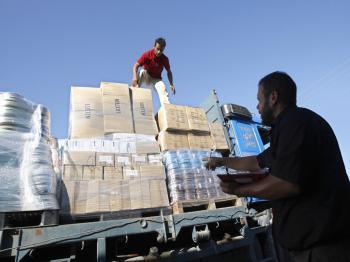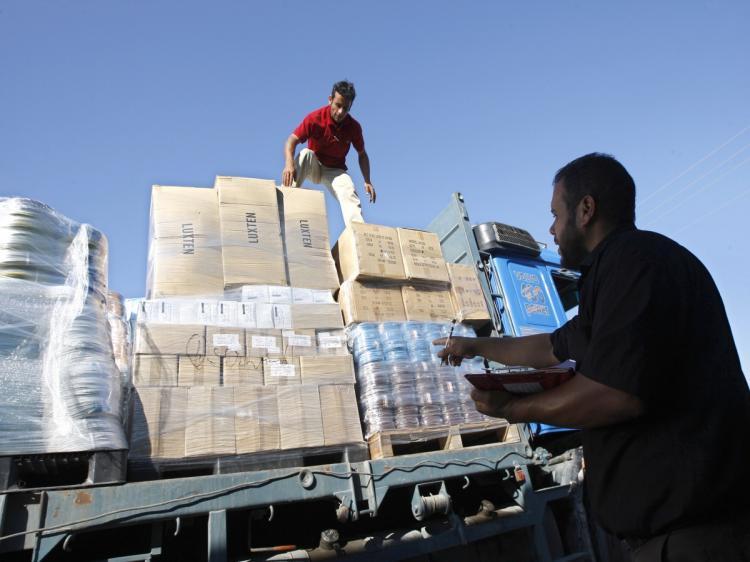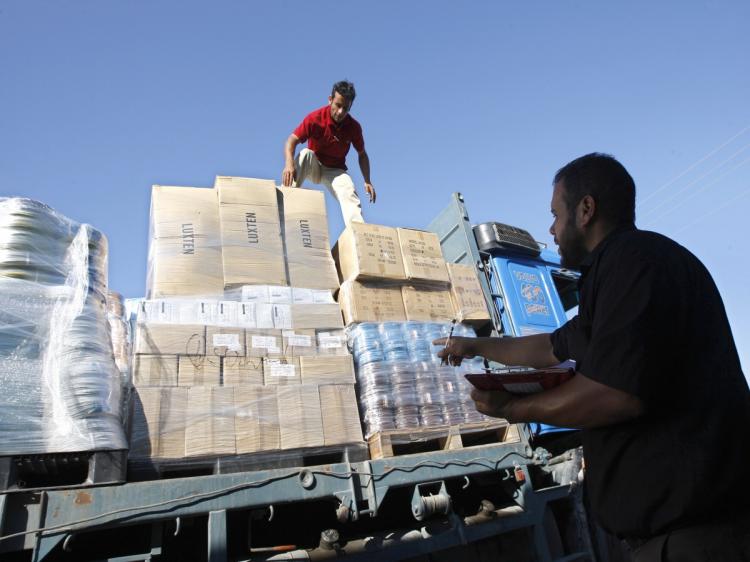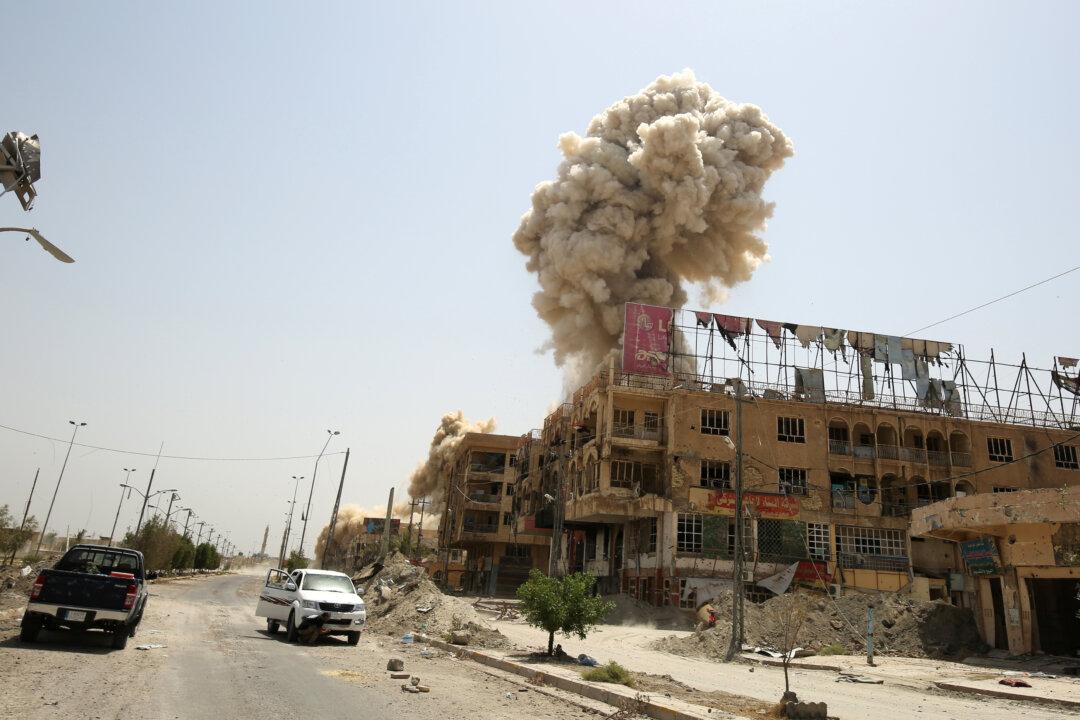JERUSALEM—The cloud of tension that has dogged Israel in recent months is lifting after Jerusalem announced this week details of its eased restrictions on goods entering the Gaza Strip.
The announcement has been greeted warmly by Washington. Israeli Prime Minister Benjamin Netanyahu met President Obama at the White House on Tuesday after which Obama stated that the bond between the United States and Israel is “unbreakable.” Obama commended Netanyahu’s government for allowing more goods into Gaza.
“We’ve seen real progress on the ground,” said President Obama in a statement published by the White House.
Obama added that his administration’s position is that compromise between Israel and the PA is the key to moving forward.
“We believe that there is a way to make sure that the people of Gaza are able to prosper economically, while Israel is able to maintain its legitimate security needs in not allowing missiles and weapons to get to Hamas,” said Obama.
Netanyahu focused more generally on peace between the Israelis and Palestinians and the path to achieve that.
“I think at the end of the day, peace is the best option for all of us, and I think we have a unique opportunity and a unique time to do it,” said Netanyahu.
Netanyau also reiterated that he is ready for direct peace talks with the Palestinians.
“I think it’s high time to begin direct talks. I think with the help of President Obama, [Palestinian Authority] President Abbas and myself should engage in direct talks to reach a political settlement of peace, coupled with security and prosperity.”
As Netanyahu prepared to go to Washington, the Israeli government announced details of its eased restrictions for Gaza. The restrictions deal with the transfer of goods and materials going into Gaza.
During a press conference Monday in Israel, details of a June 20 Israeli Cabinet decision to liberalize the system for allowing civilian goods into Gaza were described to the press.
Foreign Ministry Director General Ambassador Yossi Gal and Coordinator of Government Activities in the Territories Maj. Gen. Eitan Dangot explained the new standards.
Gal opened his statement by emphasizing the ongoing campaign to get Israeli soldier Gilad Shalit released, calling on the international community to join the campaign. Shalit was kidnapped by Hamas four years ago and has been held captive since.
A massive, national grass-roots campaign in Israel is being led by his family on the anniversary of his capture to pressure the government to secure his release. Amid pressure from the international community to ease restrictions on Gaza, the Israeli government has repeatedly raised Shalit’s situation in connection with updates on the easing of restrictions.
“On a day like this we should all remember one person, Gilad Shalit, now four years in captivity,” said Gal in his comments, released by the Ministry of Foreign Affairs on their website. “I think that the entire world should call and act to, in the words of the Quartet statement of June 21, put an end to this deplorable detention of Gilad Shalit and to demand of Hamas ’to immediately remedy the situation.'”
The Israeli Cabinet’s list of items prohibited from entering Gaza includes weapons, weapons materials, and dual-use items. Authorization was expanded for construction materials for Palestinian Authority (PA)-approved projects under international supervision. Crossing operations were also expanded to make room for more goods entering Gaza. The Cabinet also stated their intent to work with the PA to authorize and implement the measures.
An Israeli nonprofit organization called Gisha, which states on its website that it works to protect the freedom of movement of Palestinians, particularly Gaza residents, had strong words of opposition to the new measures on Gaza.
“There can be no economic recovery unless Israel ends its ban on manufacturers in Gaza exporting finished products,” said Gisha in statement issued on Monday, adding that Israel’s true policy is to cripple the Gaza economy and keep it separated from the West Bank.
“There can be no healthy, intact Palestinian society and no two-state solution unless Israel allows Palestinians to travel between Gaza and the West Bank,” says Gisha.
Israel’s official position has always been that materials and equipment considered dangerous to Israel if they fell into the wrong hands include a wide variety of items that must be prohibited. The items include various chemicals usable in the production of explosives, including certain fertilizers, composite materials, hunting knives, optical equipment, certain navigation aids, parachutes, gliders, nonmotorized airborne vehicles, fireworks, avionics, flight control equipment, and missile-related computer technologies, and other items.
Regarding projects, in cooperation with U.N. delegations, USAID organizations, European countries, and the PA, in the coming months, Maj. Gen. Dangot said the Israeli government anticipates 31 new projects will be approved by government authorities, bringing the total number of projects in the Gaza Strip to 45.
They include projects in education, health, infrastructure in sewage and water, and eventually will include housing.
Dangot also stated that the Israeli government plans to form closer relations with the PA and increase their involvement in activities within Gaza. He added that the Israeli side had already met with the Palestinians.
The announcement has been greeted warmly by Washington. Israeli Prime Minister Benjamin Netanyahu met President Obama at the White House on Tuesday after which Obama stated that the bond between the United States and Israel is “unbreakable.” Obama commended Netanyahu’s government for allowing more goods into Gaza.
“We’ve seen real progress on the ground,” said President Obama in a statement published by the White House.
Obama added that his administration’s position is that compromise between Israel and the PA is the key to moving forward.
“We believe that there is a way to make sure that the people of Gaza are able to prosper economically, while Israel is able to maintain its legitimate security needs in not allowing missiles and weapons to get to Hamas,” said Obama.
Netanyahu focused more generally on peace between the Israelis and Palestinians and the path to achieve that.
“I think at the end of the day, peace is the best option for all of us, and I think we have a unique opportunity and a unique time to do it,” said Netanyahu.
Netanyau also reiterated that he is ready for direct peace talks with the Palestinians.
“I think it’s high time to begin direct talks. I think with the help of President Obama, [Palestinian Authority] President Abbas and myself should engage in direct talks to reach a political settlement of peace, coupled with security and prosperity.”
Eased restrictions
As Netanyahu prepared to go to Washington, the Israeli government announced details of its eased restrictions for Gaza. The restrictions deal with the transfer of goods and materials going into Gaza.
During a press conference Monday in Israel, details of a June 20 Israeli Cabinet decision to liberalize the system for allowing civilian goods into Gaza were described to the press.
Foreign Ministry Director General Ambassador Yossi Gal and Coordinator of Government Activities in the Territories Maj. Gen. Eitan Dangot explained the new standards.
Gal opened his statement by emphasizing the ongoing campaign to get Israeli soldier Gilad Shalit released, calling on the international community to join the campaign. Shalit was kidnapped by Hamas four years ago and has been held captive since.
A massive, national grass-roots campaign in Israel is being led by his family on the anniversary of his capture to pressure the government to secure his release. Amid pressure from the international community to ease restrictions on Gaza, the Israeli government has repeatedly raised Shalit’s situation in connection with updates on the easing of restrictions.
“On a day like this we should all remember one person, Gilad Shalit, now four years in captivity,” said Gal in his comments, released by the Ministry of Foreign Affairs on their website. “I think that the entire world should call and act to, in the words of the Quartet statement of June 21, put an end to this deplorable detention of Gilad Shalit and to demand of Hamas ’to immediately remedy the situation.'”
The Israeli Cabinet’s list of items prohibited from entering Gaza includes weapons, weapons materials, and dual-use items. Authorization was expanded for construction materials for Palestinian Authority (PA)-approved projects under international supervision. Crossing operations were also expanded to make room for more goods entering Gaza. The Cabinet also stated their intent to work with the PA to authorize and implement the measures.
An Israeli nonprofit organization called Gisha, which states on its website that it works to protect the freedom of movement of Palestinians, particularly Gaza residents, had strong words of opposition to the new measures on Gaza.
“There can be no economic recovery unless Israel ends its ban on manufacturers in Gaza exporting finished products,” said Gisha in statement issued on Monday, adding that Israel’s true policy is to cripple the Gaza economy and keep it separated from the West Bank.
“There can be no healthy, intact Palestinian society and no two-state solution unless Israel allows Palestinians to travel between Gaza and the West Bank,” says Gisha.
Israel’s official position has always been that materials and equipment considered dangerous to Israel if they fell into the wrong hands include a wide variety of items that must be prohibited. The items include various chemicals usable in the production of explosives, including certain fertilizers, composite materials, hunting knives, optical equipment, certain navigation aids, parachutes, gliders, nonmotorized airborne vehicles, fireworks, avionics, flight control equipment, and missile-related computer technologies, and other items.
Regarding projects, in cooperation with U.N. delegations, USAID organizations, European countries, and the PA, in the coming months, Maj. Gen. Dangot said the Israeli government anticipates 31 new projects will be approved by government authorities, bringing the total number of projects in the Gaza Strip to 45.
They include projects in education, health, infrastructure in sewage and water, and eventually will include housing.
Dangot also stated that the Israeli government plans to form closer relations with the PA and increase their involvement in activities within Gaza. He added that the Israeli side had already met with the Palestinians.






